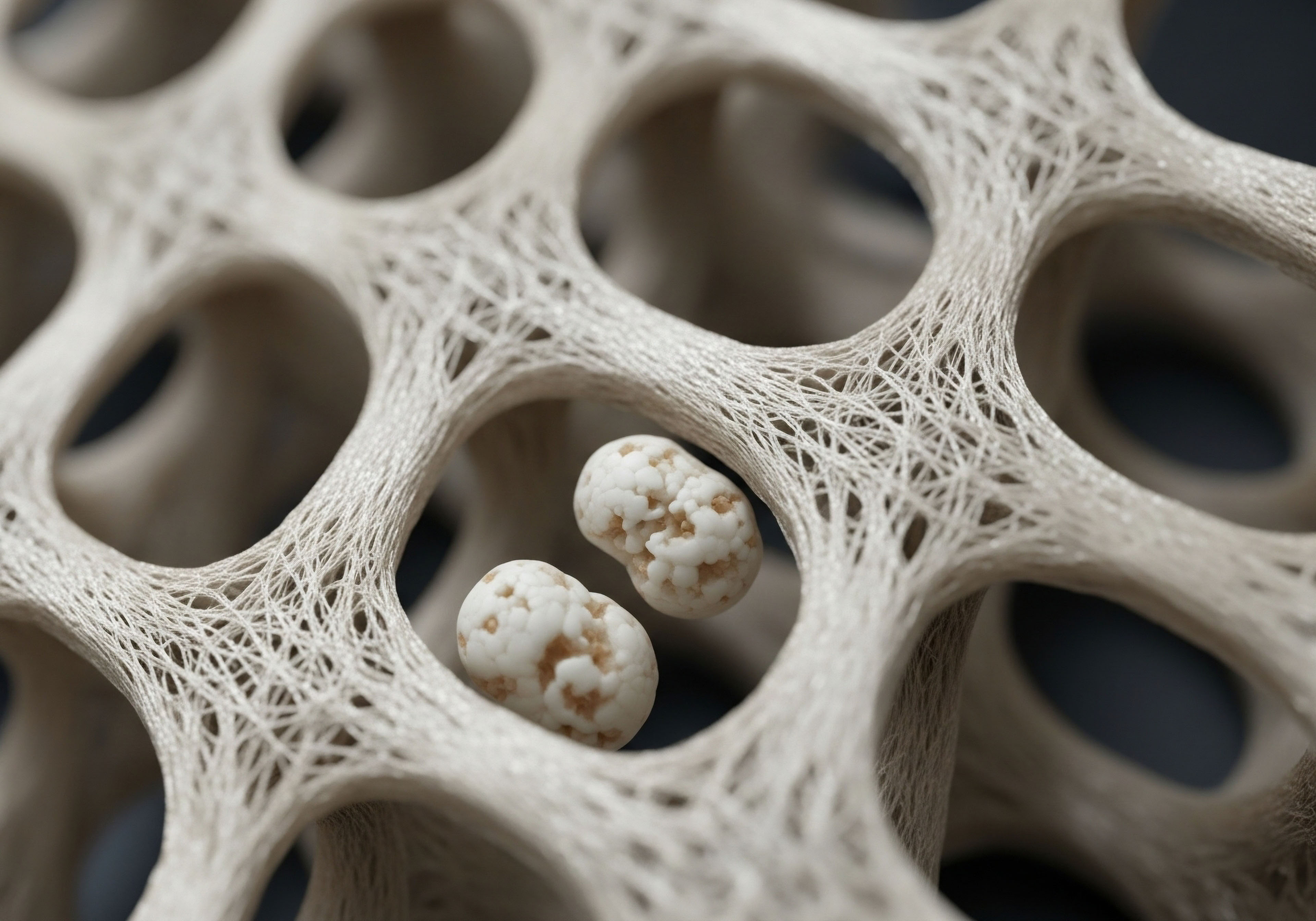

Fundamentals
The experience of navigating symptoms related to hormonal imbalances, particularly those associated with Polycystic Ovary Syndrome, can often feel like an intricate puzzle, leaving many seeking clarity and effective strategies for systemic recalibration. Many individuals report a deep desire to understand their own biological systems, aiming to reclaim vitality and optimal function without compromise. The question of whether lifestyle-induced epigenetic changes can sustain PCOS remission addresses a profound hope for lasting well-being.
Polycystic Ovary Syndrome presents as a complex endocrine-metabolic condition, affecting millions of women globally. It manifests through hormonal imbalances, irregular menstrual cycles, and metabolic challenges. Understanding the dynamic interplay between daily habits and the body’s intricate messaging systems is a significant step toward managing this condition effectively.
Understanding the body’s intricate systems is key to navigating hormonal imbalances like Polycystic Ovary Syndrome.
At the heart of this discussion lies epigenetics, a fascinating field that explores how external factors influence gene activity without altering the fundamental DNA sequence. These epigenetic modifications act as regulatory switches, turning genes on or off, thereby shaping how the body expresses its genetic code. Research indicates that specific epigenetic markers play a substantial role in the development and progression of PCOS.

What Are Epigenetic Modifications?
Epigenetic modifications represent chemical changes to DNA or its associated proteins that influence gene expression. These alterations include DNA methylation, histone modifications, and microRNA activity. Unlike fixed genetic mutations, these changes are inherently reversible, offering a promising avenue for therapeutic interventions and personalized care. These molecular signatures provide insight into the condition and suggest pathways for tailored treatment options.
DNA methylation involves the addition of a methyl group to a DNA base, often leading to gene silencing. Histone modifications, such as acetylation or methylation, alter the structure of chromatin, influencing gene accessibility. MicroRNAs, small non-coding RNA molecules, regulate gene expression by targeting messenger RNA. These mechanisms collectively modulate how genes related to hormone production, insulin regulation, and ovarian function are expressed, directly influencing the intensity of PCOS symptoms.

How Lifestyle Influences Gene Expression
Daily habits exert a direct influence on the epigenetic landscape. Diet, regular physical activity, stress management techniques, and consistent sleep routines can modulate gene expression patterns. These lifestyle factors act as natural modulators of ovarian epigenetics, providing a practical, non-pharmacological pathway for managing PCOS.
- Dietary Choices ∞ Nutrient-rich diets, characterized by high fiber and low glycemic carbohydrates, along with lean proteins and plant-based omega-3 sources, significantly affect epigenetic mechanisms such as DNA methylation and histone acetylation. These dietary patterns can improve insulin sensitivity and reduce systemic inflammation, both critical factors in PCOS pathophysiology.
- Physical Activity ∞ Regular physical activity helps with weight management, reduces insulin resistance, and lowers elevated cholesterol and testosterone levels often observed in PCOS. Exercise can influence DNA methylation enzymes, thereby improving glucose tolerance and ovarian function.
- Stress Management ∞ Techniques such as mindfulness or yoga support epigenetic regulation and enhance mental well-being, contributing to overall hormonal balance.
- Environmental Exposures ∞ Limiting exposure to endocrine-disrupting chemicals (EDCs) also supports epigenetic health. These substances interfere with hormones, leading to changes in gene expression, and their avoidance forms a crucial part of a holistic wellness strategy.


Intermediate
For those already familiar with the fundamental concepts of Polycystic Ovary Syndrome, the subsequent inquiry naturally progresses to the clinical protocols and underlying mechanisms that translate lifestyle changes into sustained remission. The journey toward managing PCOS involves understanding the ‘how’ and ‘why’ behind therapeutic interventions, recognizing that the endocrine system functions as a complex, interconnected network.
Lifestyle modifications stand as the primary intervention for PCOS, especially in individuals with obesity or insulin resistance. These changes aim to recalibrate metabolic dysfunction and improve reproductive health. The efficacy of these interventions stems from their ability to positively influence the body’s epigenetic machinery, leading to more favorable gene expression profiles.
Lifestyle modifications, through their influence on epigenetic mechanisms, represent a primary strategy for managing PCOS.

Insulin Resistance and Epigenetic Modulation
Insulin resistance represents a central feature of PCOS, affecting a significant proportion of those with the condition. This decreased sensitivity to insulin leads to compensatory hyperinsulinemia, which can exacerbate androgen production and other metabolic issues. The mechanisms underlying skeletal muscle insulin resistance in PCOS involve impaired mitochondrial oxidative metabolism and altered signaling pathways.
Epigenetic changes play a substantial role in this insulin dysregulation. Specific genes, including CEBPB, NCOR1, and PPARG, exhibit altered methylation patterns linked to insulin resistance in PCOS. Lifestyle interventions, particularly dietary adjustments and physical activity, directly influence these epigenetic markers. For instance, studies indicate that exercise and alternate-day feeding can decrease the expression of certain DNA methyltransferases (DNMT1, DNMT3B) while increasing others (DNMT3A), thereby modulating gene expression and improving glucose tolerance.

The Role of Weight Optimization
Weight optimization, often a direct outcome of sustained lifestyle changes, holds significant sway over PCOS remission. Even a modest weight reduction, typically 2-5% of total body weight, can restore ovulatory menstrual periods in individuals with obesity-associated PCOS. This improvement is accompanied by a reduction in hirsutism, improved glucose tolerance, and better lipid profiles. The decline in body weight diminishes the characteristic features of PCOS, leading to menstrual regulation and enhanced reproductive outcomes.
The influence of weight management extends to the epigenetic level. Research indicates that individuals with obesity-associated PCOS exhibit higher levels of serum global methylation compared to those without obesity. This observation suggests that obesity functions not only as a phenotypic expression but also as an epigenetic modifier, perpetuating the disease process. Consequently, interventions promoting healthy weight can induce epigenetic shifts that support sustained remission.

Hormonal Optimization Protocols
While lifestyle changes form the cornerstone, specific hormonal optimization protocols can support the body’s recalibration when indicated. These protocols aim to address persistent hormonal imbalances that lifestyle alone may not fully resolve.
| Hormone/Agent | Primary Action in PCOS Context | Mechanism of Support |
|---|---|---|
| Metformin | Improves insulin sensitivity | Decreases hepatic glucose production, enhances peripheral glucose uptake, and can modestly reduce androgen levels. |
| Progesterone | Regulates menstrual cycles | Supports uterine lining, induces regular shedding, and counters effects of unopposed estrogen, particularly in anovulatory cycles. |
| Anastrozole | Aromatase inhibition | Reduces estrogen conversion from androgens, which can be beneficial in specific hyperandrogenic scenarios, though less common as a primary PCOS treatment. |
These agents work synergistically with lifestyle interventions to restore endocrine balance. For instance, metformin, an insulin-sensitizing medication, directly addresses the metabolic dysfunction at the core of many PCOS presentations, leading to reduced circulating androgen levels and improved ovulation rates. This comprehensive approach underscores the interconnectedness of metabolic and hormonal pathways in achieving and sustaining PCOS remission.


Academic
Delving into the long-term efficacy of lifestyle-induced epigenetic changes in sustaining Polycystic Ovary Syndrome remission necessitates a sophisticated understanding of systems biology, molecular endocrinology, and the dynamic nature of gene regulation. The discussion moves beyond surface-level definitions to explore the profound impact of environmental inputs on the genome’s interpretive layer, ultimately shaping the trajectory of metabolic and reproductive health.
PCOS, as a polygenic and multifactorial disorder, exhibits a complex etiology where genetic predispositions interact with environmental and lifestyle factors. This interaction manifests through epigenetic modifications, which do not alter the DNA sequence itself but rather dictate how and when genes are expressed. Sustained remission, therefore, relies on the continuous positive modulation of these epigenetic marks.
Sustained PCOS remission hinges on continuous positive modulation of epigenetic marks influenced by lifestyle and environmental factors.

The Epigenetic Landscape in PCOS Pathogenesis
The epigenetic landscape in PCOS is characterized by aberrant DNA methylation patterns, histone modifications, and dysregulated microRNA expression, particularly within ovarian granulosa cells, adipose tissue, and skeletal muscle. These alterations contribute to the hallmark features of the syndrome, including hyperandrogenism, insulin resistance, and ovulatory dysfunction.
For instance, DNA hypomethylation in granulosa cells, specifically within the LHCGR gene promoter, correlates with increased gene expression and contributes to ovarian dysfunction in PCOS. Conversely, hypermethylation of genes involved in inflammation and cell proliferation, such as TNIK, can upregulate their activity in ovarian tissue, further disrupting metabolic profiles. Histone modifications, particularly increased acetylation of histone H3 and methylation of H3K9, contribute to reduced CYP19A1 expression, leading to decreased cytochrome P450 aromatase activity and subsequent hyperandrogenism.

Intergenerational Epigenetic Transmission
A compelling aspect of PCOS pathogenesis involves the concept of intergenerational epigenetic transmission. Exposure to an unfavorable intrauterine environment, characterized by elevated androgen and anti-Müllerian hormone (AMH) levels, can induce fetal programming effects. This prenatal androgenization can epigenetically alter the development of target tissues, predisposing offspring to develop PCOS phenotypes later in life. These epigenetic changes, particularly in DNA methylation, can be transmitted across generations, impacting at least three successive lineages.
The molecular mechanisms underpinning this inheritance involve persistent epigenetic marks in germ cells. For example, studies have identified irregular patterns in epigenetic markers, such as H3K27me3, within oocytes and early embryos of individuals with PCOS, affecting genes involved in metabolic processes and early embryonic DNA activation. This suggests that an epigenetic signal is passed from mother to embryo even before implantation, offering a potential avenue for preventative interventions in future generations.

Long-Term Recalibration through Lifestyle
The sustained efficacy of lifestyle interventions in achieving PCOS remission stems from their capacity to induce adaptive epigenetic changes that recalibrate dysregulated biological pathways. Diet and exercise function as powerful environmental cues that directly influence chromatin modifier enzymes, thereby reversing or mitigating aberrant gene expression.
Consider the impact on insulin signaling. Regular physical activity and specific dietary patterns (e.g. low-glycemic, high-fiber) improve insulin sensitivity by modulating the methylation status of genes such as CEBPB, NCOR1, and PPARG, which are intimately linked to glucose homeostasis. This leads to a reduction in compensatory hyperinsulinemia, a primary driver of hyperandrogenism in PCOS.
The systemic reduction in inflammation and oxidative stress, also influenced by lifestyle, further contributes to a more favorable endocrine milieu, dampening the feedback loops that perpetuate PCOS symptoms.
| Epigenetic Mechanism | Lifestyle Influence | Biological Outcome in PCOS Remission |
|---|---|---|
| DNA Methylation | Diet (folate, B12), Exercise, Environmental Toxin Reduction | Normalizes gene expression for insulin signaling (e.g. CEBPB, PPARG), reduces androgen synthesis, improves ovarian function. |
| Histone Modification | Diet (butyrate, polyphenols), Exercise, Stress Management | Restores chromatin accessibility for genes related to steroidogenesis (e.g. CYP19A1), reduces inflammation, enhances metabolic flexibility. |
| MicroRNA Activity | Nutrient intake, Physical Activity | Modulates post-transcriptional gene regulation, impacting metabolic, inflammatory, and androgen pathways. |
The long-term efficacy of these lifestyle-induced epigenetic shifts reflects the body’s remarkable capacity for adaptation and self-regulation. By consistently providing beneficial environmental signals, individuals can reprogram their gene expression, moving toward a state of sustained metabolic and hormonal balance. This dynamic process underscores that while genetic predispositions exist, the epigenome offers a profound interface for proactive health management and the potential for lasting remission.

References
- Oana. “PCOS and Epigenetic Modifications ∞ What to Know.” Oana, (Accessed 2025).
- “The Role of Genetics, Epigenetics and Lifestyle in Polycystic Ovary Syndrome Development ∞ the State of the Art.” ResearchGate, (Accessed 2025).
- “Ovarian epigenetics modifications following lifestyle interventions by exercise and alternate-day feeding in letrozole-induced PCOS rats.” PubMed, (Accessed 2025).
- “Polycystic Ovarian Syndrome Genetics and Epigenetics.” PMC, (Accessed 2025).
- “What Causes PCOS ∞ The Role of Epigenetics.” Lilli Health, (Accessed 2025).
- “Can Polycystic Ovarian Syndrome be cured? Unfolding the Concept of Secondary Polycystic Ovarian Syndrome!” PMC – PubMed Central, (Accessed 2019).
- “Remission of polycystic ovary syndrome based on the recovery of ovarian morphology identified by three-dimensional power doppler ultrasonography:a retrospective cohort study.” Endocrine Abstracts, (Accessed 2025).
- “Polycystic Ovarian Syndrome Treatment & Management.” Medscape Reference, (Accessed 2023).

Reflection
The journey toward understanding and recalibrating one’s biological systems, particularly in the context of conditions like Polycystic Ovary Syndrome, marks a significant step in personal health autonomy. The insights shared regarding lifestyle-induced epigenetic changes are not merely academic concepts; they represent actionable knowledge.
This information serves as a foundational element, prompting a deeper introspection into your own unique biological blueprint and how daily choices can influence its expression. Your path to reclaiming vitality and function without compromise requires a personalized approach, often guided by expert clinical translation. Consider this understanding a powerful starting point, inviting you to engage more profoundly with your body’s inherent capacity for adaptation and sustained well-being.



